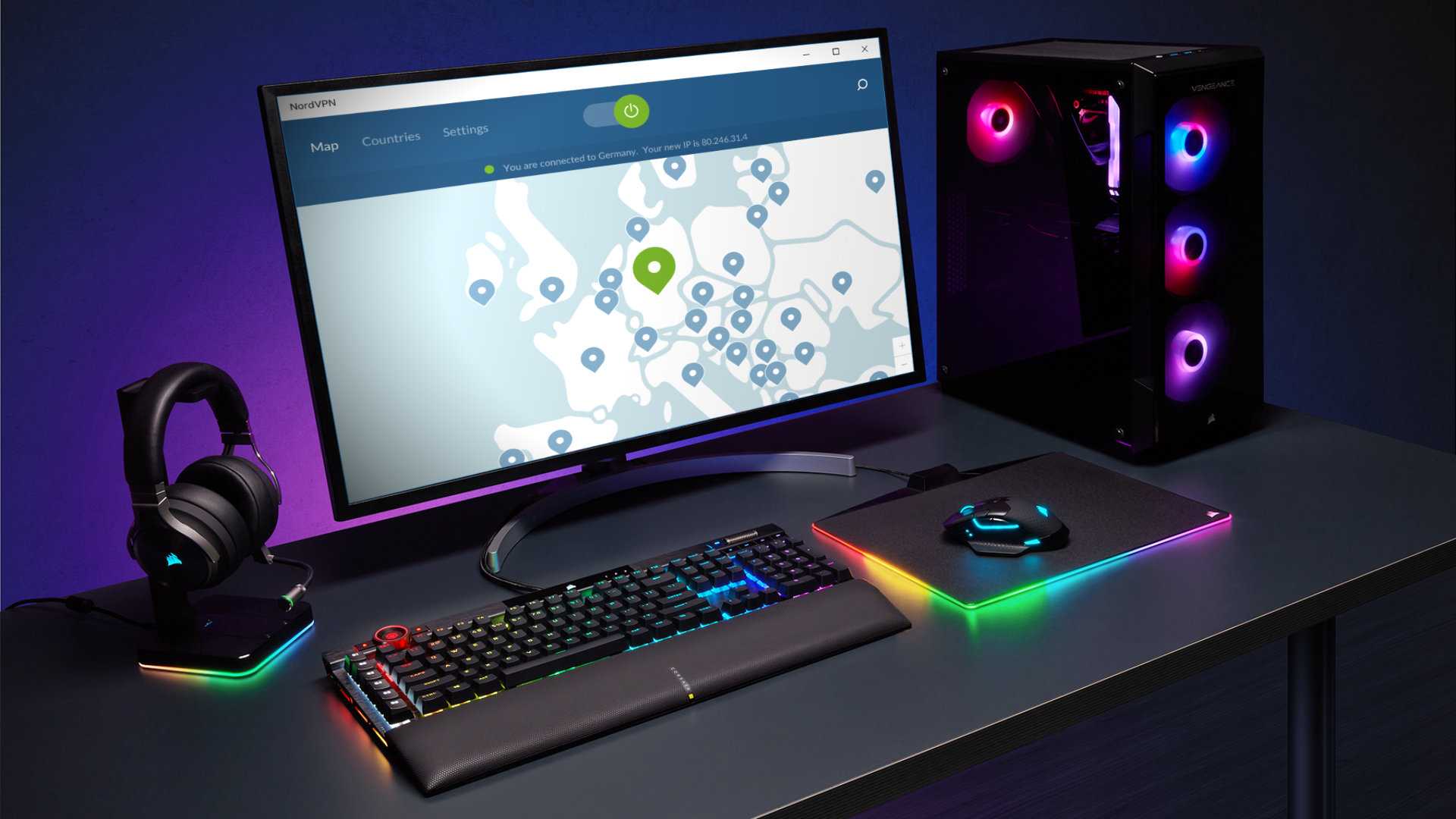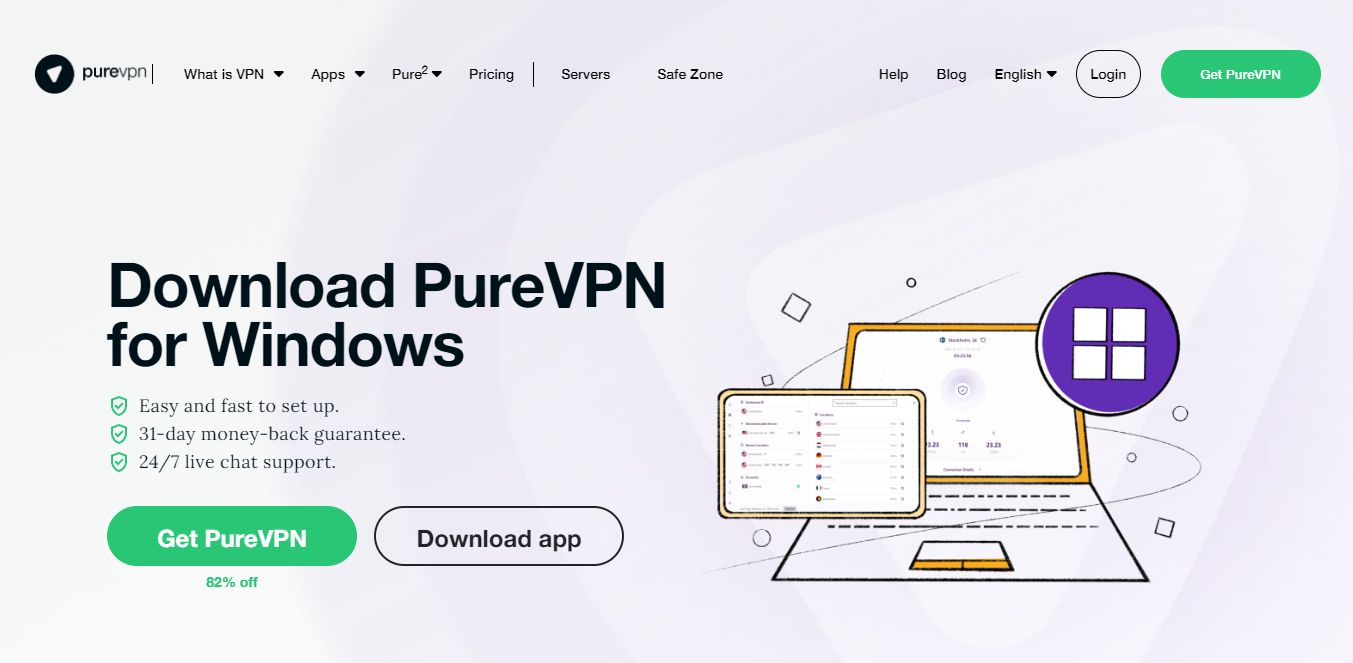Introduction
Welcome to the world of online gaming! With the rapid advancement of technology and the ubiquitous presence of high-speed internet, online gaming has become a widespread phenomenon enjoyed by millions of people around the globe. Whether you’re a casual gamer or a serious competitor, playing games online offers a thrilling and immersive experience like no other.
However, with the rise in popularity of online gaming, there are certain challenges that gamers face, such as security risks, geographical restrictions, and latency issues. This is where a Virtual Private Network (VPN) comes into play. A VPN is a powerful tool that can enhance your online gaming experience and overcome these obstacles.
In this article, we will explore the world of online gaming through a VPN and discuss its benefits, how it works, and how you can utilize it to optimize your gaming sessions. So, if you’re curious about how a VPN can revolutionize your online gaming experience, read on!
What is a VPN?
A VPN, short for Virtual Private Network, is a technology that allows users to create a secure and encrypted connection over a public network like the internet. It works by routing your internet traffic through a secure server located in a different geographical location, thereby masking your online identity and IP address.
When you connect to a VPN, your data is encrypted and sent through a secure tunnel, protecting it from prying eyes and potential cyber threats. This means that even if someone intercepts your data, they won’t be able to decipher the information, ensuring your online activities remain private and secure.
Furthermore, a VPN provides you with a new IP address associated with the server location you choose. This allows you to bypass geographic restrictions and access content that may be blocked in your country. For example, if a game is not available in your region, you can connect to a VPN server in a country where the game is accessible and enjoy uninterrupted gaming sessions.
Moreover, a VPN offers the benefit of anonymity. Your real IP address is hidden, and your online activities are associated with the IP address of the VPN server you are connected to. This adds an extra layer of privacy by making it difficult for anyone to track your online actions back to you.
In summary, a VPN provides you with security, privacy, and the ability to bypass restrictions. It creates a virtual tunnel between your device and the internet, ensuring that your sensitive information remains protected and allowing you to access online content that may be restricted in your location.
How does a VPN work?
Understanding how a VPN works is essential to grasp its benefits for online gaming. It involves several steps that ensure your internet connection is secure and private:
- Encryption: When you connect to a VPN, your data is encrypted before it is sent over the internet. This encryption ensures that even if someone intercepts your data, they won’t be able to decipher it without the decryption key.
- Tunneling: A VPN creates a secure tunnel between your device and the VPN server. All your internet traffic passes through this tunnel, protecting it from eavesdroppers and hackers.
- VPN Server: The VPN server acts as an intermediary between your device and the websites or gaming servers you want to access. It masks your IP address with its own, giving you anonymity and protecting your real location.
- IP Address Spoofing: By connecting to a VPN server located in a different country, you can spoof your IP address. This means that your online activities will appear as if they are originating from the VPN server’s location, bypassing any restrictions imposed based on your real location.
- Crypto Protocols: VPNs use various encryption protocols to secure your data, such as OpenVPN, IPsec, or WireGuard. These protocols ensure the integrity and confidentiality of your online communications.
In simple terms, a VPN creates a secure and private connection between your device and the internet. It encrypts your data, hides your IP address, and masks your real location, providing you with enhanced security, privacy, and the ability to access blocked content.
It is important to note that not all VPNs are created equal. Some VPNs may have slower connection speeds or weaker encryption, which can affect your gaming experience. Therefore, choosing the right VPN provider is crucial to ensure a smooth and lag-free gaming session.
Benefits of using a VPN for online gaming
A VPN offers several advantages for online gaming enthusiasts. Let’s take a closer look at some of the key benefits:
- Improved security and privacy: One of the primary benefits of using a VPN for online gaming is enhanced security. By encrypting your internet traffic, a VPN protects your sensitive data from potential hackers, ensuring that your gaming sessions remain secure. Additionally, a VPN masks your real IP address, making it difficult for anyone to track your online activities back to you.
- Bypassing geo-restrictions: Many online games and gaming platforms enforce geographical restrictions, limiting access to specific regions. With a VPN, you can bypass these restrictions by connecting to a server located in a country where the game is accessible. This allows you to enjoy games that may not be available in your region and play with friends from around the world.
- Reducing lag and improving gameplay: Slow internet speeds and high latency can severely impact your gaming experience, causing lags and delays. By connecting to a VPN server that is closer to the gaming server, you can reduce the distance your data needs to travel, resulting in lower latency and smoother gameplay. Some VPNs even offer dedicated gaming servers optimized for optimal performance.
- Protection against DDoS attacks: Distributed Denial of Service (DDoS) attacks are a common form of cyber attack that can disrupt your gaming sessions by overwhelming your internet connection. However, when you game through a VPN, your traffic passes through the VPN server, which can help mitigate and protect against DDoS attacks, ensuring uninterrupted gameplay.
- Access exclusive game releases and early access: Some game developers release their games in certain regions or offer early access to specific countries. By connecting to a VPN server in the designated region, you can gain access to exclusive game releases or enjoy early access to highly anticipated games.
These benefits make using a VPN a valuable tool for online gamers. Whether it’s for heightened security, accessing restricted games, reducing lag, or enjoying exclusive releases, a VPN can enhance your gaming experience and open up new possibilities.
Improved security and privacy
When it comes to online gaming, security and privacy should be top priorities. By using a VPN, you can significantly enhance both aspects of your gaming experience. Here’s how:
1. Encryption: A VPN encrypts your online traffic, ensuring that your data is protected from potential hackers and cybercriminals. This encryption process converts your data into an unreadable format, making it nearly impossible for anyone to intercept and decipher your sensitive information. This is especially important when you’re engaged in multiplayer gaming, where you may be sharing personal details or communicating with other players.
2. Secure connection: When you connect to a game server through a VPN, your data passes through a secure tunnel. This means that even if you’re on a public Wi-Fi network, your information remains encrypted and safeguarded. Public Wi-Fi networks are notorious for their lack of security, making them prime targets for hackers. By using a VPN, you can protect your gaming sessions from potential threats and enjoy peace of mind while gaming on the go.
3. Anonymity: A VPN masks your real IP address and replaces it with the IP address of the VPN server you’re connected to. This makes it difficult for anyone to trace your online activities back to your location or identity. Whether you want to remain anonymous while playing online or protect yourself from potential cyberattacks, a VPN can provide that added layer of anonymity.
4. Protection against DDoS attacks: Distributed Denial of Service (DDoS) attacks are a common problem in the online gaming world. These attacks overload your internet connection, causing lag and disrupting your gameplay. However, when you use a VPN, your internet traffic passes through the VPN server, which can help mitigate DDoS attacks. This adds an extra layer of protection and ensures smoother gaming sessions.
5. Privacy from internet service providers (ISPs): Internet service providers have the ability to monitor and track your online activities. By using a VPN, you can prevent your ISP from tracking your gaming habits, as your data is encrypted and your IP address is masked. This helps preserve your privacy and allows you to enjoy online gaming without concerns about your ISP monitoring your activities.
Overall, using a VPN for online gaming provides you with improved security for your personal information, protects your privacy from ISPs, and safeguards your gaming sessions from potential threats. With a VPN, you can focus on enjoying your favorite games while knowing that your security and privacy are well-protected.
Bypassing geo-restrictions
One of the major advantages of using a VPN for online gaming is the ability to bypass geo-restrictions. Geo-restrictions are limitations placed on accessing certain games, platforms, or gaming content based on your geographical location. Here’s how a VPN can help you overcome these restrictions:
1. Access blocked games: Game developers sometimes release their games in specific regions, leaving players in other parts of the world unable to access them. By connecting to a VPN server in a region where the game is available, you can bypass these restrictions and gain access to the game. This allows you to play new and exciting games that would otherwise be unavailable in your location.
2. Enjoy region-specific game content: Some games feature region-specific content, such as exclusive in-game items, events, or game modes. A VPN allows you to connect to a server located in the region where the content is available, enabling you to experience and enjoy these region-specific features. This opens up new possibilities and enhances your gaming experience.
3. Play with friends around the world: Online gaming is all about connecting with friends and playing together. However, if your friends are in a different region and the game is restricted in your location, you may face difficulties in joining them. By using a VPN, you can connect to a server in the same region as your friends, allowing you to play together without any restrictions.
4. Access regional gaming platforms: Some gaming platforms, such as gaming streaming services or online gaming communities, may be available only in specific regions. By utilizing a VPN, you can bypass these restrictions and access these platforms regardless of your actual location. This expands your gaming options and grants you access to a wider range of gaming experiences.
5. Participate in early game releases: Game developers often release games earlier in specific regions before making them available globally. With a VPN, you can connect to a server located in a region where the game is launching early, enabling you to participate as soon as the game is released. This gives you a head start and allows you to dive into the game before players in other regions.
By using a VPN to bypass geo-restrictions, you can break down barriers and enjoy a more inclusive and diverse gaming experience. Whether it’s accessing blocked games, region-specific content, playing with friends across the globe, or participating in early releases, a VPN gives you the freedom to explore and enjoy the full extent of the online gaming world.
Reducing lag and improving gameplay
One of the common frustrations in online gaming is experiencing lag and delays during gameplay. However, using a VPN can help reduce lag and enhance your overall gaming experience. Here’s how:
1. Optimized routing: When you connect to a VPN server, your internet traffic is rerouted through a different network pathway. This can result in improved routing, reducing the number of hops and the distance your data needs to travel to reach the game server. By choosing a VPN server closer to the gaming server, you can minimize latency and reduce lag, resulting in smoother gameplay.
2. Lower latency: Latency, also known as ping, is the time it takes for data to travel from your device to the game server and back. Higher latency can result in delays between your actions and the game’s response, which can be frustrating during fast-paced and competitive games. By using a VPN, you can select a server location closer to the game server, reducing the physical distance your data needs to travel and lowering latency.
3. Dedicated gaming servers: Some VPN providers offer dedicated gaming servers that are optimized for online gaming. These servers are specifically designed to provide the best gaming experience by minimizing latency and optimizing network performance. By connecting to these specialized gaming servers, you can significantly reduce lag and enjoy smoother gameplay.
4. Traffic congestion avoidance: During peak gaming hours, internet service providers (ISPs) may experience network congestion, leading to higher latency and slower connections. By using a VPN, you can bypass the congestion on your ISP’s network by connecting to a VPN server with lower traffic. This can result in faster and more stable connections, reducing lag and improving gameplay.
5. Stable connections: Unstable internet connections can disrupt your gaming experience, leading to sudden disconnections or gameplay interruptions. A VPN can provide a more stable connection by offering features like automatic reconnection. If your connection drops temporarily, the VPN will automatically reconnect you to the server, ensuring you don’t get kicked out of your game or experience unnecessary interruptions.
By using a VPN to reduce lag and improve gameplay, you can enjoy a smoother and more responsive gaming experience. The ability to select optimized routing paths, lower latency through server selection, access dedicated gaming servers, avoid traffic congestion, and maintain stable connections all contribute to an enhanced gaming experience.
How to use a VPN for online gaming
Using a VPN for online gaming is relatively straightforward and can significantly enhance your gaming experience. Follow these steps to get started:
1. Choose the right VPN: Select a reputable VPN provider that offers fast connections, strong security features, and a wide range of server locations. Look for VPNs that specifically mention gaming optimization or have dedicated gaming servers.
2. Install the VPN software: Download and install the VPN software on your gaming device. Most VPN providers offer software for various platforms, including Windows, macOS, iOS, and Android.
3. Create an account: Sign up for an account with the VPN provider. This will usually require providing an email address and creating a password.
4. Launch the VPN application: Open the VPN application and log in using your account credentials.
5. Choose a server: Select a server location that is close to the gaming server you want to connect to. This will help reduce latency and improve gameplay. Some VPN applications may also have specialized servers optimized for gaming.
6. Connect to the VPN server: Click on the connect button to establish a connection with the VPN server. Wait for the connection to establish, and you will be assigned a new IP address associated with the server location you chose.
7. Start gaming: Once you’re connected to the VPN server, launch your favorite online game or gaming platform. You should now be able to enjoy the benefits of gaming through a VPN, such as reduced lag, bypassing restrictions, and enhanced security.
8. Adjust settings (if needed): Depending on your gaming preferences, you may want to explore the VPN settings. Some VPNs offer options to automatically connect when you launch the gaming application or allow you to select specific servers as favorites for quick access.
Remember to keep the VPN client running in the background while gaming to maintain an encrypted and secure connection. If you experience any issues with your VPN connection, such as slow speeds or connectivity problems, try connecting to a different server or contacting your VPN provider for support.
By following these steps, you can easily set up and use a VPN for online gaming, unlocking a world of benefits and improving your gaming experience.
Choosing the right VPN for gaming
When it comes to online gaming, choosing the right VPN is crucial to ensure a smooth and reliable gaming experience. Here are some factors to consider when selecting a VPN for gaming:
1. Speed and latency: A VPN should offer fast and stable connections to minimize latency and reduce any potential impact on your gaming experience. Look for VPN providers that have a reputation for providing high-speed connections and low latency.
2. Server locations: The availability of server locations is important, especially if you want to bypass geo-restrictions or connect to specific game servers. Make sure the VPN provider has servers in regions where your desired gaming content is accessible or where the game servers are located.
3. Gaming-specific features: Some VPN providers cater specifically to gamers by offering features like dedicated gaming servers, optimized routing for gaming traffic, and protection against DDoS attacks. Look for VPNs that prioritize gaming-related features to optimize your gaming experience.
4. Security and privacy: Ensure the VPN has robust security measures in place. Look for features like strong encryption protocols, a no-logs policy that ensures your online activities are not recorded, and a kill switch feature that automatically disconnects you from the internet if the VPN connection drops, protecting your privacy.
5. Compatibility: Consider the compatibility of the VPN with your gaming device. Ensure that the VPN provider offers software or apps that are compatible with your specific device, whether it’s Windows, macOS, iOS, Android, or gaming consoles.
6. User-friendly interface: A user-friendly VPN interface makes it easier to connect to servers, switch between locations, and access settings. Look for a VPN provider that offers an intuitive and easy-to-use interface, especially if you’re new to using VPN services.
7. Customer support: Check for the availability of customer support. Look for VPN providers that offer 24/7 customer support through various channels like live chat, email, or phone. This ensures that you can seek assistance if you encounter any issues while using the VPN for gaming.
8. Pricing and plans: Consider the pricing and subscription plans offered by different VPN providers. Compare the features and benefits of each plan to determine which one best suits your needs and budget. Look for providers that offer flexible plans with reasonable prices.
Take the time to research and read reviews from trusted sources or fellow gamers to gather insights about different VPN providers’ performance and reputation. This will help you make an informed decision and choose a VPN that meets your specific gaming requirements.
By considering these factors and finding a VPN that aligns with your gaming needs, you can optimize your gaming experience and enjoy the benefits of enhanced security, reduced lag, and wider access to gaming content.
Setting up a VPN for gaming
Setting up a VPN for gaming is a straightforward process. Follow these steps to get your VPN up and running for an enhanced gaming experience:
1. Choose a VPN provider: Select a reputable VPN provider that suits your gaming needs based on factors like speed, server locations, security, and gaming-specific features.
2. Sign up and subscribe: Create an account with the VPN provider and choose a subscription plan that aligns with your budget and desired length of service.
3. Download and install the VPN software: Visit the VPN provider’s website and download the VPN software or app that corresponds to your gaming device’s operating system.
4. Install and launch the VPN software: Run the downloaded VPN software and follow the installation instructions provided. Once installed, launch the VPN application.
5. Log in to your VPN account: Enter your VPN account credentials (username and password) to log in to the VPN application.
6. Configure VPN settings: Depending on your preferences, you may want to adjust certain settings. Common options include automatic connection on startup, selecting a specific VPN server, or enabling features like the kill switch.
7. Choose a server location: Select a VPN server location that is optimum for your gaming needs, such as finding a server closer to your gaming server’s physical location to reduce latency.
8. Connect to the VPN server: Click the “Connect” button in the VPN application to establish a connection with the chosen server. Wait for the connection to establish, and you should see a confirmation that you are connected to the VPN server.
9. Verify VPN connection: Confirm that your gaming device has successfully connected to the VPN server. You can do this by checking your IP address to ensure it matches the server location you selected.
10. Start gaming: With the VPN connection established, launch your preferred gaming platform or game and enjoy your gaming session with the added benefits of improved security, reduced lag, and bypassing geo-restrictions.
If you face any issues during the setup process or experience connectivity difficulties, refer to the VPN provider’s support documentation or reach out to their customer support for assistance.
Remember to keep your VPN software running in the background while gaming to maintain an encrypted connection and enjoy the continued benefits of using a VPN for gaming.
Tips for getting the best gaming experience with a VPN
To ensure the best gaming experience while using a VPN, consider the following tips:
1. Choose a server close to the gaming server: Select a VPN server that is geographically close to the location of the gaming server. This can help reduce latency and improve connection stability, resulting in smoother gameplay.
2. Opt for dedicated gaming servers: Some VPN providers offer dedicated servers optimized specifically for gaming. These servers are designed to prioritize gaming traffic, resulting in lower latency, reduced lag, and an optimized gaming experience.
3. Connect to a less congested server: In times of high network congestion, connecting to a less crowded VPN server can help maintain a stable connection and minimize lag. Check with your VPN provider for information on server load or choose a less popular server location for better performance.
4. Test different VPN server locations: If you experience performance issues, try connecting to different VPN server locations to find the one that offers the best performance for your gaming needs. Running tests with various server locations can help you identify the optimal choice.
5. Use wired connections: Whenever possible, connect your gaming device directly to the internet router with an Ethernet cable. Wired connections are generally more stable and provide lower latency compared to Wi-Fi connections, resulting in a smoother gaming experience when using a VPN.
6. Optimize VPN settings: Adjusting VPN settings can sometimes improve your gaming experience. For example, enabling split tunneling allows you to route only gaming traffic through the VPN while letting other internet traffic directly access the internet, optimizing your bandwidth usage.
7. Limit background network usage: While gaming, close any bandwidth-intensive applications or downloads running in the background. This helps prioritize network resources for your gaming sessions, reducing potential interference and improving overall performance.
8. Monitor and compare performance: Keep an eye on your gaming experience with and without the VPN enabled. Compare factors like latency, connection stability, and overall gameplay performance to determine if the VPN is positively or negatively impacting your gaming sessions.
9. Update your device and VPN software: Ensure both your gaming device’s operating system and the VPN software are up to date. Updates often include performance enhancements, bug fixes, and security improvements, ensuring a smoother gaming experience.
10. Consult with your VPN provider: If you experience persistent issues or have specific questions, reach out to your VPN provider’s customer support. They can provide guidance, troubleshoot issues, and help you optimize your VPN settings for gaming.
By implementing these tips, you can optimize your gaming experience while using a VPN and enjoy smoother gameplay, reduced lag, and improved security.
Conclusion
A Virtual Private Network (VPN) has become an invaluable tool for online gamers, providing numerous benefits to enhance their gaming experience. By understanding how a VPN works and its applications in the gaming world, gamers can overcome security risks, bypass geo-restrictions, and improve gameplay.
Through improved security and privacy features, a VPN ensures that gamers can engage in online gaming activities with peace of mind, knowing that their personal information is protected and their online activities remain private.
Furthermore, a VPN allows gamers to bypass geo-restrictions, granting access to games, game content, and gaming platforms that may be inaccessible in their region. By connecting to VPN servers in desired locations, gamers can expand their gaming opportunities and enjoy region-specific features.
Reducing lag and improving gameplay is a priority for online gamers, and a VPN can help achieve this. By selecting VPN servers closer to gaming servers, utilizing dedicated gaming servers, and optimizing network routing, gamers can minimize latency and experience smoother, more responsive gameplay.
Setting up a VPN for gaming is a straightforward process that involves selecting the right VPN provider, installing the VPN software, and connecting to desired servers. By following the recommended tips, gamers can further enhance their gaming experience and optimize VPN settings for the best possible performance.
In conclusion, utilizing a VPN for online gaming offers a range of benefits, including improved security, bypassing geo-restrictions, and reducing lag. By carefully selecting a reliable VPN provider, configuring the VPN software appropriately, and optimizing network settings, gamers can elevate their gaming experience to new heights, enjoying seamless gameplay, enhanced privacy, and access to a broader range of gaming opportunities.

























